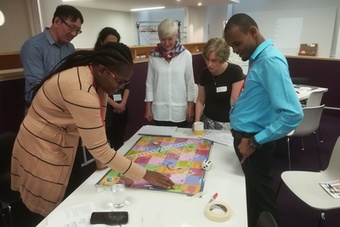Capacity development
Solutions to the complex challenges driving social-ecological crises require transdisciplinary research approaches involving the co-production of knowledge between researchers and research users for science-based decision making.
A core aim of Sentinel is to enhance capacity of UK and African researchers to co-develop with research users (notably policy makers) excellent and relevant interdisciplinary research on the impacts, risks and trade-offs within and between social, economic and environmental dimensions of different agricultural development pathways that relate to SDGs 2, 10 and 15.
Using a participatory process that combines state-of-the-art research with effective research user engagement, Sentinel will enhance the capacity of researchers in the UK, Zambia, Ethiopia, and Ghana to:
- Investigate sustainable development challenges through interdisciplinary research
- Increase the relevance of their research to key information needs of research users by engaging effectively with them throughout the research process
- Ensure that research findings can be readily applied both during the timeframe of the programme and on an on-going basis.
Our partnership with RUFORUM, a pan-African consortium of African Universities, will contribute to strengthening capacity of researchers beyond the three target countries to conduct relevant research at the agricultural/environment nexus and to strengthen their teaching in this respect. Capacity development is embedded throughout the programme as an integral part of the research agenda, building on frameworks of research capacity development developed as part of the UK Department for International Development’s research strategy. Sentinel recognises that effective organisational systems, processes and relationships are key to ensuring that research is relevant, makes the best use of existing knowledge, and that researchers are well connected, motivated and rewarded. As such, Sentinel is using collaborative research / learning, interactive training and mentoring of junior staff, and direct engagement with senior university managers in the UK and in Africa to overcome capacity constraints.
Based on a capacity needs assessment, Sentinel will also employ tangible activities to strengthen technical and 'process-oriented' capacities for co-developing research and implementing research outputs with researcher users to address the Sentinel aims. These may include knowledge-building workshops, training workshops, seminars, or webcasts.
Blogs

The impact of COVID-19 has been felt heavily in all sectors globally and it is still wreaking havoc on economies.

On 4 December 2020 Sentinel colleagues welcome you to a session on ’Understanding and managing food security – nature conservation trade-offs: concepts and methods for decision-making’.

IIED’s Communications Learning Week in late June hosted by the institute’s communications team was timely and highly opportune for the Sentinel project.
Pagination
- Previous page
- Page 3
- Next page





